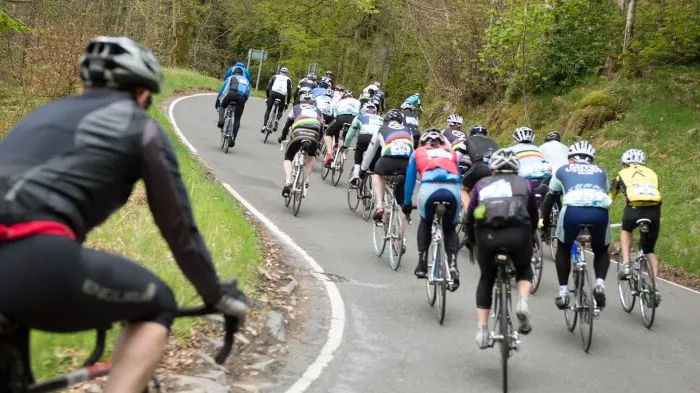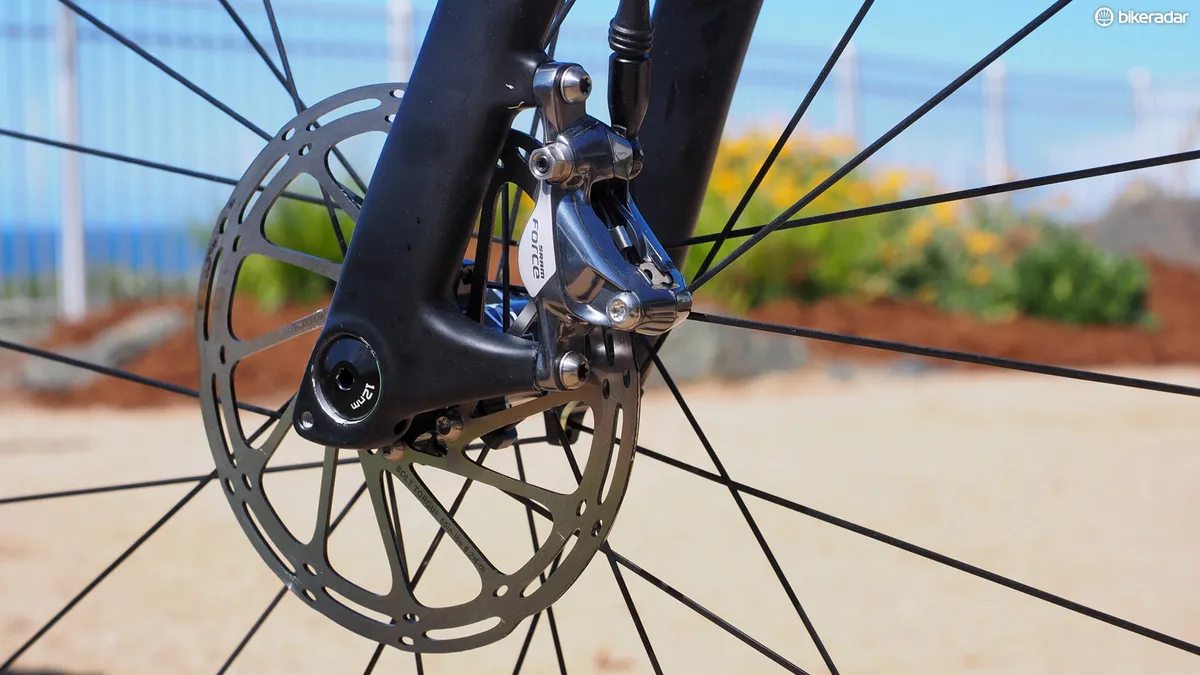The argument in favour of disc-brake technology, in the pro peloton at least, took years to gain traction but its downfall, in the wake of Fran Ventoso’s injury at Paris-Roubaix, was swift. The Movistar rider, writing in the aftermath of the race in an open letter, was adamant that the deep flesh wound on his left leg was caused by a disc brake rotor from another rider’s bike.
Graphic photos of a blood-soaked Ventoso lying on the side of the road emerged, with the Spaniard looking as though he’d been involved in a knife fight. He called the brakes "machetes" that should "never have arrived in the pro peloton".
"I haven’t met any rider who has run out of braking power with traditional brakes," Ventoso added.
Despite the evidence as to what caused the injury being inconclusive, it was enough to force the UCI’s hand, with the usual glacial movements of the governing body replaced with what many felt was a knee-jerk reaction when it put an immediate halt to the disc brake trial in WorldTour racing. They may never be seen again, certainly in their current guise.
A thorny issue
Discs have long been a thorny issue in pro racing; while many riders are against them, arguing that rim brakes are safer and plenty for their needs, there’s opposing pressure from manufacturers, who, with an ever-increasing stake in pro road racing as non-bike industry sponsors continue to vacate, see it as a both an improvement on rim brakes in terms of safety and a lucrative area to explore in the amateur cycling world.
This argument was summed up in BikeRadar US editor Ben Delaney’s recent article. Merida’s PR Manager Michael Wilkens told him that brand “fully believe[s] in the future of disc brakes on road bikes”, while former pro Baden Cooke pointed out that discs' added weight alone would have stopped him from using them.
"But I don’t think they are dangerous," Cooke told Delaney. “I think that’s bullshit. For amateur riders – I think this whole thing has been blown out of proportion. If you are in a race where the UCI rules don’t apply, it wouldn’t be dangerous at all. I simply wouldn’t use it because it don’t think it's advantageous. If anyone else wants to use it, go ahead."
Despite wanting to see the back of them in pro racing, Ventoso is also for their use in amateur events, saying: "I’m [as] in favour as anyone else that cyclocross professionals or participants in sportives enjoy the advantages of disc brakes during their rides".

Riders in French and Spanish sportives have already seen discs restricted
But that will no longer be the case for many amateurs riding in French and Spanish sportives. The French Cycling Federation (FFC) has banned disc brakes in all events under its jurisdiction, including the Etape du Tour and Paris-Roubaix Challenge (you can see the full list here), while the Spanish federation has reportedly done likewise. That apparent bombshell came to a shock to one of our staffers, who’s just travelled out to the Majorca 312 sportive with a disc-braked bike. Fingers crossed he gets round the course without being ousted by a commissaire.
There’s better news for disc brake users in the UK. A British Cycling spokesperson confirms to Cycling Plus that it doesn't currently "have a ban on disc brakes in sportives, and this isn’t on the agenda to change anytime soon”, and it’s the same situation at Britain’s biggest sportive, RideLondon.
"Safety is our priority and we continually review equipment that's permitted in our non-competitive cycling events," says event director Hugh Brasher. "Currently we don’t have any plans to ban the use of disc brakes for our mass participation cycling events."
A simple lack of necessity?
Both Ventoso's and Cooke's argument against disc brakes in pro racing, aside from the safety concerns, is that they simply aren't necessary. Rim brakes have been used for a very long time, very successfully, and despite the prevailing belief that discs are better up to the job of braking, pro riders are skilled enough not to need the extra power.
But in sportives, performance-wise, there are many proponents of the technology when compared with the alternatives, including our own tech writer Matthew Allen.
"In mass-participation events, you may end up descending in big groups where you’re forced to brake continuously because other riders are in the way. In that situation, disc brakes are greatly preferable to carbon clinchers, for example, as heat management is less of a problem," he says.
But what of the safety concerns of disc brakes? Shouldn't these supposed 'machete'-like rotors be as dangerous in sportives as professional racing, if not even more so, particularly in chaotic free-for-alls like RideLondon and the Etape du Tour?
First of all, Allen says he's a bit sceptical about the veracity of Ventoso's claims, given "how many other sharp bits" there are on bikes.
"But really there's not enough data to make a reasoned judgement," he goes on. "The UCI ban was incredibly knee-jerk and I'd like to have seem some actual evidence that his injury was really caused by a disc – we only have his word for it that it was. Having said that, there's no other reason other than economy why discs couldn't have bevelled edges, which would definitely reduce the chances of serious injury."
Cycling Plus tech editor Warren Rossiter believes it's a major own goal for disc brakes to be outlawed in the big European sportives. "First of all I'd say that I'd much rather see people descending with disc brakes than with standard brakes on carbon or alloy rims. Less experienced descenders tend to drag their brakes for a lot longer, building heat. On discs heat is managed better, and because of the improved feel at the lever you're less likely to lock up the wheels as braking is more controllable and comes in sooner than a rim brake, so less time is needed on them to regulate speed."
He's also disappointed by the UCI's decision."I'd like to see figures on how many riders have been slashed, cut or gored by the biggest, sharpest bits on a bike – the chainrings. Strangely they haven't outlawed them, but then what rider would want to compete on a bike using a belt drive?
"Yes I can see problems with the difference in braking ability between discs and standard brakes when riding in a mass group of a 100 or so riders, but in reality most sportives tend to spread out thinner than the pro peloton," Rossiter concludes. "Large European events outlawing discs is massively counter productive. Most riders have one bike so if they’ve invested in the latest and (better) technology of discs they’re scuppered."

